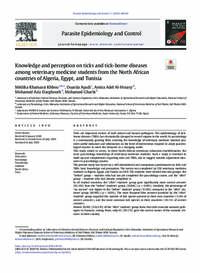Knowledge and perception on ticks and tick-borne diseases among veterinary medicine students from the North African countries of Algeria, Egypt, and Tunisia

Authors:
Ticks are important vectors of both animal and human pathogens. The epidemiology of tickborne diseases (TBDs) has dramatically changed in several regions in the world. As parasitology
is a continuously growing field, assessing the knowledge of veterinary medicine students provides useful indicators and information on the level of intervention required to adapt parasitological courses to meet the demands in a changing world.
This study aimed to assess, in three North African veterinary education establishments, the
basic parasitology knowledge of veterinary medicine students. Such a study is essential to
build up core competencies regarding ticks and TBDs, and to suggest suitable adjustment measures to parasitology courses.
The present study was based on a self-administered and anonymous questionnaire on ticks and
TBDs basic knowledge and perception. The survey was completed by 558 veterinary medicine
students in Algeria, Egypt, and Tunisia in 2018. The students were divided into two groups: the
“before” group – students who had not yet completed the parasitology course, and the “after”
group – students who had already completed it.
In all studied countries, the “after” students' group gave significantly more correct answers
(83.16%) than the “before” students' group (16.84%) (p < 0.001). Similarly, the percentage of
“no answer” was higher in the “before” students' group (51.02%) compared to the “after” students' group (48.98%) (p < 0.001). The most frequent false answers provided by the “after”
students' group regarded the number of tick species present in their own countries (5.14% of
correct answers), and the most common tick species in their countries (18.11% of correct
answers).
Almost 58.38% (216/370) of the “after” students' group knew that ticks transmit zoonotic pathogens to humans; among them, only 63 (29.17%) gave the correct names of the zoonotic diseases in their country.
